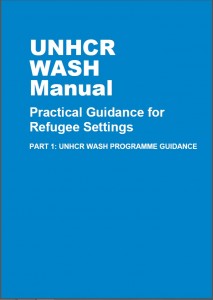
The UNHCR WASH Manual Part 1: Programme Guidance, provides practical guidance for WASH programmes in refugee settings.
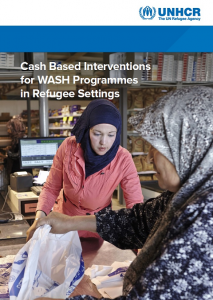
This report is based on a desk-based review of secondary data, comprising published material as well as grey literature, supplemented with key informant interviews for programmes that lacked documentation. Section One summarises the current use of CBI in WASH programming. Section Two summarises the best practices and lessons learned including challenges faced, drawing on evidence from the project examples found. Section Three provides recommendations and best practice guidance for use of CBI in refugee settings. Section Four details existing tools and guidance.

This toilet block management sample community agreement can help define the responsibilities of the different stakeholders in operation and maintenance of WASH facilities from filling up the hand-washing water containers, and keeping the surroundings clean, to providing maintenance.

A sample organigram for running a typical refugee WASH programme for 20,000 people in a post emergency camp based setting. The organigram gives an indication of how the WASH Team should be structured in addition to the tentative number of Coordinators, Team Leaders, Officer, and Assistant level staff that should be recruited.
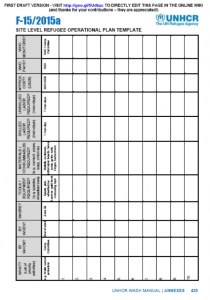
This template can be used to help UNHCR and WASH actors establish a simple WASH operational plan (WHO will do WHAT, WHERE, WHEN, and HOW and WHO will PAY and WHO will MONITOR). This template can be used in addition to the site level WASH Strategy Template.

The Sphere Handbook is one of the most widely known and internationally recognized sets of common principles and universal minimum standards for the delivery of quality humanitarian response.
Tags: Bathing Facilities, Capacity Building, Capacity Building, Capacity Building, Disability, Disability, Disease Vector Control, Drainage, Environment, Environment, Gender, Gender, Gender Based Violence, Gender Based Violence, Grey Water Disposal, Handwashing with Soap, Human Right to Water / Sanitation, Human Right to Water / Sanitation, Hygiene Promotion, Laundering Facilities, Menstruation Hygiene Management, Protection, Protection, Public Health, and Solid Waste Management. Organisations: SPHERE.

These guidelines have been designed to help those involved in the assessment of emergency water sources to collect relevant information in a systematic way, to use this information to select a source or sources and to determine the appropriate level of treatment required to make the water suitable for drinking.
Tags: Boreholes, Bulk Water Treatment, Drilling, Groundwater, Hand Dug Wells, Handpumps, Household Water Treatment, Household Water Treatment, Piped Water Networks, Piped Water Networks, Rainwater Harvesting, Solar Pumping, Spring Protection, Water Prospection and Investigation, Water Pumping, Water Quality Testing and Surveillance, Water Quality Testing and Surveillance, Water Safety Plans, Water Safety Plans, Water Storage, Water Supply, Water Supply, and Water Tankering.
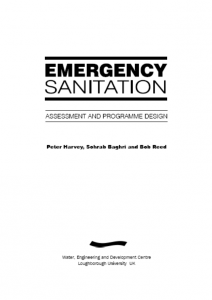
The book Emergency Sanitation: Assessment and programme design has been produced to assist those involved in planning and implementing emergency sanitation programmes. The main focus of the book is a systematic and structured approach to assessment and programme design. It provides a balance between the hardware (technical) and software (socio-cultural, institutional) aspects of sanitation programmes, and links short-term emergency response to long-term sustainability. The book is relevant to a wide range of emergency situations, including both natural and conflict-induced disasters, and open and closed settings. It is suitable for field technicians, engineers and hygiene promoters, as well as staff at agency headquarters.
Tags: Communal Toilets, Communal Toilets, Communal Toilets, Desludging and Excreta Transportation, Excreta / Urine ReUse, Excreta Composting, Excreta Management, Excreta Management, Excreta Management, Excreta Treatment, Household Toilets, and Sewerage and Excreta Conveyance. Organisations: WEDC and WEDC. Categories: WASH Emergency Guidelines and WASH Emergency Guidelines.

Where required, UNHCR and WASH actors should work together to develop a site level refugee WASH strategy document that clearly describes the refugee context, the baseline WASH situation, WASH coverage, WASH gaps, along with short (6 months), medium (6 months – 5 years) and long-term (>5 years) strategies for each of the WASH sub-sectors and the twelve (12) WASH principles. This template can be used to help produce the site level WASH Strategy.
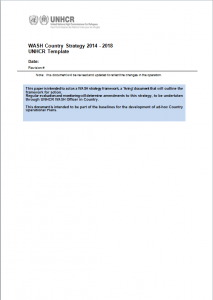
Where required, UNHCR and WASH actors should work together to develop a country level refugee WASH strategy document that clearly describes the refugee context, the baseline WASH situation, WASH coverage, WASH gaps, along with short (6 months), medium (6 months – 5 years) and long-term (>5 years) strategies for each of the WASH sub-sectors and the twelve (12) WASH principles. This template can be used to help produce the Country level WASH Strategy.
Tags: Cross Cutting, Cross Cutting, Cross Cutting, Cross Cutting, Cross Cutting, Cross Cutting, Cross Cutting, Cross Cutting, WASH Assessments, WASH Assessments, WASH Assessments, WASH Assessments, WASH Assessments, WASH Assessments, WASH Coordination, WASH Coordination, WASH Coordination, WASH Coordination, WASH Coordination, WASH Monitoring, WASH Monitoring, WASH Monitoring, WASH Monitoring, WASH Monitoring, WASH Monitoring, WASH Monitoring, WASH Strategy Development, WASH Strategy Development, WASH Strategy Development, WASH Strategy Development, and WASH Strategy Development. Languages: English, English, English, English, English, English, English, English, English, and English. Organisations: UNHCR, UNHCR, UNHCR, UNHCR, UNHCR, UNHCR, and UNHCR. Categories: WASH Blank Forms, WASH Blank Forms, WASH Blank Forms, WASH Blank Forms, WASH Reference Documents, WASH Reference Documents, WASH Reference Documents, WASH Reference Documents, WASH Reference Documents, WASH Reference Documents, WASH Reference Documents, WASH Reference Documents, and WASH Reference Documents.
 English
English










